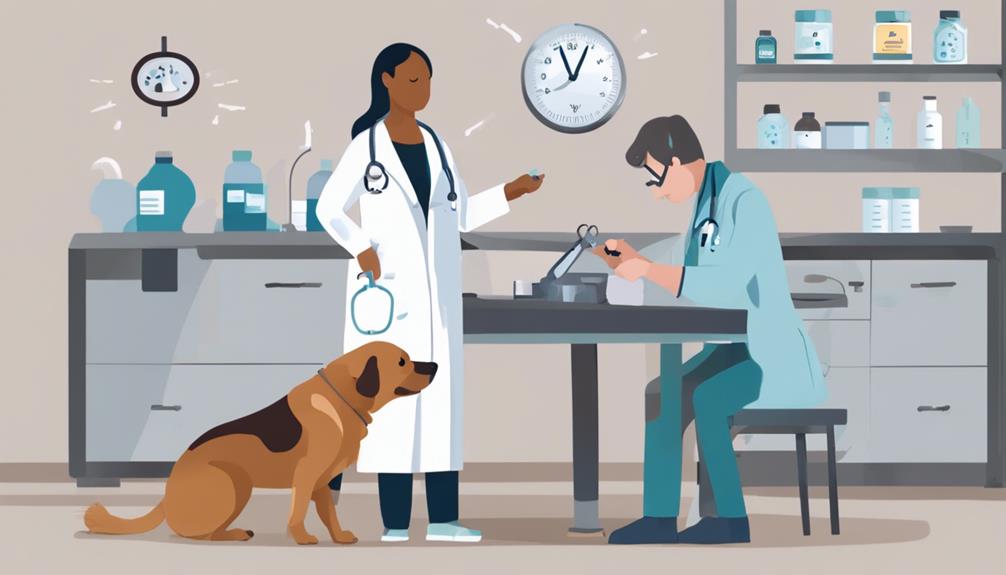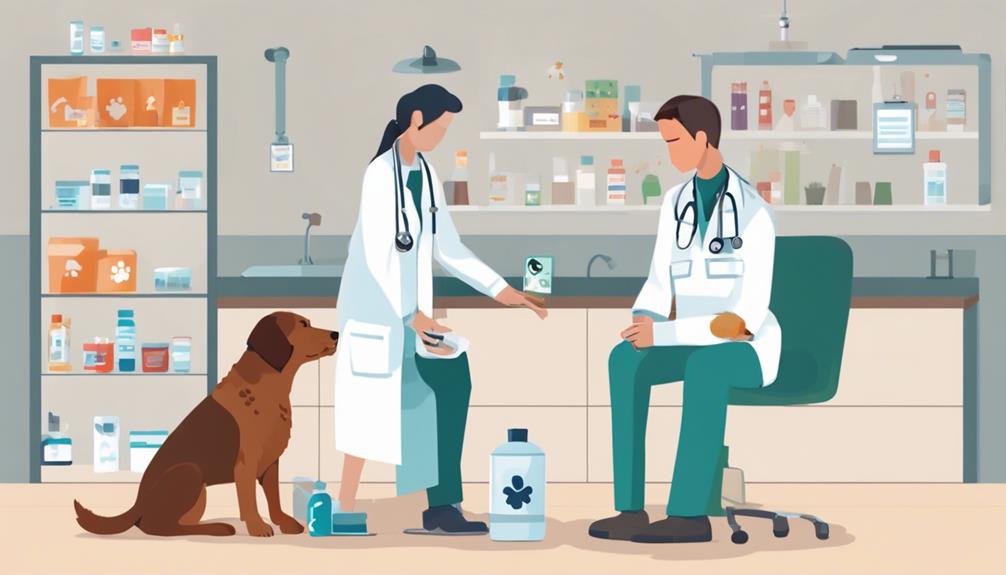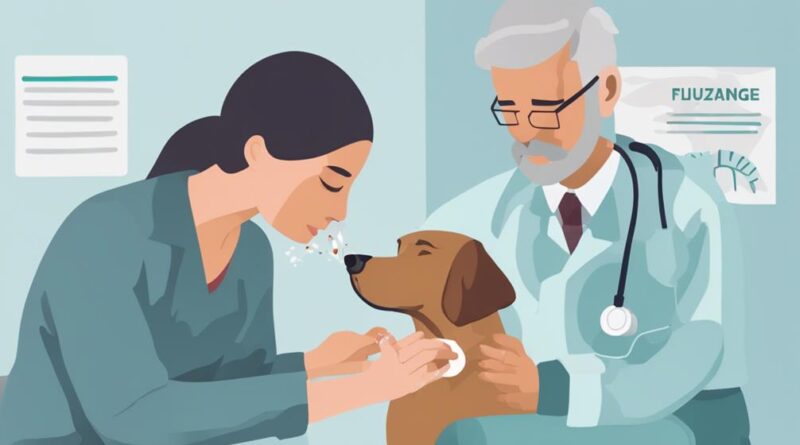11 Key Causes and Treatments for Canine Influenza
To safeguard your furry companion from canine influenza, comprehend the primary causes and treatments. This illness stems from H3N8 and H3N2 flu strains, spreading easily via respiratory secretions or close contact. Vital preventive measures include vaccination and maintaining good hygiene. Symptoms like coughing, lethargy, and nasal discharge signal infection, demanding prompt diagnosis through vet exams and lab tests. Treatment involves supportive care, use of antivirals, and keeping the dog isolated for recuperation. Stay vigilant for complications, ensuring post-recovery monitoring. Understanding these key aspects empowers you to protect your dog's well-being effectively.
Canine Influenza Overview
To understand the impact of canine influenza on dogs, it's essential to delve into a comprehensive overview of this contagious respiratory disease. Canine influenza is caused by two main strains of the influenza virus: H3N8 and H3N2. These viruses are highly contagious among dogs and can spread through respiratory secretions, contaminated objects, and close contact with infected animals. The close quarters of places like kennels, dog parks, and shelters make it easier for the virus to spread rapidly.
Preventing canine influenza is crucial in controlling its spread. Vaccination is one of the most effective ways to prevent this disease. Vaccines are available for both H3N8 and H3N2 strains, and regular vaccination can significantly reduce the risk of infection. It's essential to consult with your veterinarian to determine the most suitable vaccination schedule for your dog based on their lifestyle and risk factors.
Apart from vaccination, practicing good hygiene is key to preventing canine influenza. This includes regular handwashing after handling animals, avoiding contact with sick dogs, and cleaning and disinfecting potentially contaminated surfaces. If your dog is showing symptoms of respiratory illness, it's vital to isolate them from other animals to prevent the spread of the virus. By being proactive in vaccination and hygiene practices, you can help protect your furry companion from this contagious respiratory disease.
Common Symptoms in Infected Dogs
Common symptoms of canine influenza in infected dogs typically include respiratory issues such as coughing and sneezing, along with other signs of respiratory distress. Dogs may also exhibit nasal discharge, lethargy, fever, and reduced appetite. In severe cases, pneumonia can develop, leading to more pronounced symptoms like difficulty breathing and a persistent cough.
When managing the symptoms of canine influenza, it's crucial to provide supportive care to help your dog recover. Ensure they have access to fresh water, a comfortable resting area, and a nutritious diet. If your dog's condition worsens or if they show signs of severe respiratory distress, contact your veterinarian immediately. Treatment options may include antiviral medications, antibiotics to prevent or treat secondary bacterial infections, and supportive care to alleviate symptoms.
During the recovery process, it's important to monitor your dog closely and follow your veterinarian's instructions diligently. While most dogs recover from canine influenza with proper care, some may experience long-term effects such as a weakened immune system or respiratory issues. Regular check-ups with your veterinarian can help track your dog's progress and address any lingering concerns. By staying proactive and attentive to your dog's health, you can support their recovery and overall well-being.
Transmission Routes of the Virus
Understanding how canine influenza is transmitted is crucial in preventing its spread and protecting your dog's health. Canine influenza, also known as dog flu, is primarily spread through respiratory secretions. When an infected dog coughs, sneezes, or barks, respiratory droplets containing the virus can be released into the air. These droplets can land on surfaces or be inhaled by other dogs in close proximity, leading to the transmission of the virus.
Preventing transmission of canine influenza is essential in controlling outbreaks. It's important to avoid exposing your dog to environments where the virus may be present, such as dog parks, kennels, or grooming facilities where multiple dogs gather. Additionally, if your dog is showing symptoms of canine influenza, such as coughing, sneezing, or nasal discharge, it's crucial to isolate them from other dogs to prevent the spread of the virus. Regular handwashing and disinfection of surfaces can also help reduce the risk of transmission.
Controlling outbreaks of canine influenza requires vigilance and proactive measures. Vaccination against the virus can help protect your dog from infection and reduce the likelihood of transmission to other dogs. If an outbreak occurs in your area, following recommendations from veterinary professionals and local authorities can help contain the spread of the virus and protect the health of your pet. By being informed about how canine influenza is transmitted and taking necessary precautions, you can help prevent the spread of the virus and safeguard your dog's well-being.
Risk Factors for Canine Influenza
Minimize the risk of canine influenza by identifying key factors that increase your dog's susceptibility to the virus. One crucial aspect to consider is vaccination schedules. Ensuring your dog is up to date with their influenza vaccinations is essential in protecting them against the virus. Puppies, elderly dogs, and those with weakened immune systems are particularly vulnerable and should strictly adhere to vaccination guidelines recommended by veterinarians.
Other risk factors that can heighten your dog's chances of contracting canine influenza include frequent exposure to other dogs in places like kennels, dog parks, or training facilities where the virus can easily spread. Dogs that participate in activities where they come into close contact with other animals are also at an increased risk.
Treatment guidelines and prevention strategies are vital components in managing the risk of canine influenza. If your dog is diagnosed with the virus, it's crucial to follow the treatment plan prescribed by your veterinarian diligently. Additionally, implementing preventive measures such as practicing good hygiene by regularly cleaning your dog's living area and belongings, and avoiding contact with sick animals can significantly reduce the risk of infection.
Diagnosing the Disease in Dogs
To diagnose canine influenza in dogs, veterinarians typically perform a combination of physical examinations and laboratory tests to confirm the presence of the virus. During the physical examination, the vet will look for common symptoms such as coughing, sneezing, nasal discharge, fever, lethargy, and reduced appetite. These signs, especially when clustered with known exposure to the virus, can raise suspicion for canine influenza.
Lab testing is crucial for confirming the diagnosis of canine influenza. Nasal or throat swabs are commonly used to collect samples for testing. These samples are then analyzed using techniques like PCR (polymerase chain reaction) to detect the presence of the influenza virus. Blood tests may also be conducted to check for antibodies against the virus.
In some cases, veterinarians may recommend additional tests such as chest X-rays to evaluate the extent of lung involvement or to rule out other respiratory conditions that may present with similar symptoms. A thorough diagnostic workup is essential to differentiate canine influenza from other respiratory infections.
Once the diagnosis is confirmed, treatment options will be discussed with you. Early detection is key in managing canine influenza effectively, so prompt veterinary attention is crucial. In the next section, we'll delve into the various treatment options available for dogs diagnosed with canine influenza.
Treatment Options Available
Upon confirming the diagnosis of canine influenza in your dog, discussing available treatment options with your veterinarian is crucial for effective management of the condition. Treatment for canine influenza focuses on supportive care to help your dog recover and alleviate symptoms. Your veterinarian may recommend home care measures such as providing a warm and quiet environment, ensuring access to fresh water, and monitoring your dog's appetite and overall well-being closely.
In addition to traditional medical treatments, natural remedies and alternative therapies can sometimes be beneficial in aiding your dog's recovery from canine influenza. These can include herbal supplements, probiotics to support the immune system, and natural anti-inflammatories. However, it's essential to consult with your veterinarian before using any natural remedies to ensure they're safe and appropriate for your dog's specific situation.
Supportive treatments like humidifiers to ease respiratory symptoms, nutritional support to maintain strength, and in some cases, medications to manage fever or cough may be prescribed by your veterinarian. It's crucial to follow your vet's recommendations carefully and attend follow-up appointments to monitor your dog's progress and adjust the treatment plan if needed. Remember that each dog is unique, and the treatment approach may vary based on individual circumstances.
Importance of Isolation and Rest

Discussing the importance of isolating your dog and allowing for adequate rest is key in supporting their recovery from canine influenza.
Isolation benefits your dog by preventing the spread of the virus to other pets. Canine influenza is highly contagious, and keeping your infected dog away from healthy animals is crucial in controlling the outbreak. Additionally, isolation helps reduce the risk of secondary bacterial infections that can arise due to a weakened immune system during influenza.
Rest is equally vital in your dog's recovery process. Just like with humans, rest allows the body to focus its energy on fighting off the virus. Encourage your dog to rest by providing a comfortable and quiet space where they can relax without disturbances. Limit physical activity, as overexertion can prolong the recovery period and potentially worsen the symptoms. Adequate rest also helps prevent complications such as pneumonia, which can develop if the dog's body isn't given the chance to recuperate properly.
Vaccination for Canine Influenza
When considering vaccination for canine influenza, consulting with your veterinarian is crucial to determine the most appropriate immunization schedule for your dog. Canine influenza vaccines have been shown to be effective in reducing the severity of the illness and preventing its spread. These vaccines work by stimulating the immune system to produce antibodies that can recognize and fight off the influenza virus.
The effectiveness of the vaccine can vary depending on various factors such as the strain of the virus and the overall health of the dog. In general, most dogs respond well to the vaccine and are protected from the more severe forms of the illness. However, like any medication, vaccines can have side effects. These side effects are usually mild and may include soreness at the injection site or mild fever. Serious side effects are rare but should be reported to your veterinarian immediately.
It is important to follow the recommended immunization schedule for your dog, which may include initial vaccinations followed by booster shots to ensure continued protection. Booster shots are necessary to maintain immunity levels, as the effectiveness of the vaccine may decrease over time. Your veterinarian will be able to provide guidance on the most suitable vaccination protocol for your dog based on their individual needs and risk factors.
Potential Complications to Watch for

To monitor your dog's health after receiving the canine influenza vaccination, it's important to be vigilant for any potential complications that may arise. Respiratory complications are one of the primary concerns post-vaccination. Watch out for symptoms such as persistent coughing, wheezing, or difficulty breathing, as these could indicate a more severe issue. If you notice any of these signs, contact your veterinarian immediately for further evaluation and treatment.
Secondary infections are another possible complication to be aware of. The canine influenza virus can weaken your dog's immune system, making them more susceptible to other infections. Keep an eye on any changes in your dog's overall health, such as fever, lethargy, or loss of appetite, which could indicate a secondary infection. Prompt detection and treatment of these infections are crucial for your dog's recovery.
Monitoring your dog closely for any unusual symptoms is essential. Provide supportive care such as ensuring they've plenty of rest, fresh water, and a comfortable environment to aid in their recovery. If you have any concerns about your dog's health post-vaccination, don't hesitate to seek guidance from your veterinarian. Remember, early detection and intervention can significantly impact the outcome of any potential complications.
Preventive Measures for Dog Owners
After being aware of potential complications post-vaccination, dog owners can take preventive measures to safeguard their pets' health and well-being. Proper dog training is crucial in preventing the spread of canine influenza. Train your dog to avoid close contact with other dogs exhibiting symptoms such as coughing or sneezing. Additionally, teaching your dog basic commands like 'stay' and 'leave it' can help prevent them from coming into contact with potentially infected animals.
Regular pet grooming is another essential preventive measure. Keeping your dog clean and well-groomed can help reduce the risk of infection. Bathing your dog with veterinarian-approved shampoos and keeping their fur trimmed can prevent the virus from clinging to their coat. Pay special attention to their paws as well, as viruses can be easily spread through contaminated surfaces.
Furthermore, maintaining a clean living environment for your dog is key. Wash their bedding regularly, clean their food and water bowls daily, and disinfect their toys to minimize the risk of infection. By incorporating these preventive measures into your routine, you can help keep your furry friend safe from canine influenza. Remember, a proactive approach to your dog's health is the best defense against this contagious virus.
Recovery and Follow-Up Care

Upon your dog being diagnosed with canine influenza, implementing proper recovery and follow-up care is essential to ensure their swift return to good health. Here are some key points to consider during this crucial period:
- Post-recovery monitoring: It's vital to closely monitor your dog's progress after they've recovered from canine influenza. Keep an eye on their energy levels, appetite, and overall well-being to ensure there are no lingering symptoms or complications.
- Rehabilitation: Depending on the severity of the illness, your dog may require rehabilitation to regain their strength and stamina. This could involve gentle exercises, physical therapy, or specialized care to help them fully recover.
- Long-term care: Even after your dog has recovered, it's important to provide them with ongoing care to support their immune system. Make sure they have a balanced diet, regular exercise, and stay up to date on vaccinations to prevent future illnesses.
- Reinfection risks: Be aware of the potential risks of reinfection with canine influenza. Take precautions to prevent your dog from being exposed to the virus again, especially in high-risk environments such as dog parks or kennels.
Frequently Asked Questions
Can Canine Influenza Be Transmitted to Other Animals Besides Dogs?
Yes, canine influenza can potentially be transmitted to other animals besides dogs, particularly to cats and ferrets. This cross-species transmission poses a risk of zoonotic potential, meaning it could be spread to humans.
To prevent this, it's crucial to isolate infected dogs, practice good hygiene, and vaccinate pets if possible. Being aware of the risks and taking precautionary measures can help mitigate the spread of canine influenza to other species.
Are There Any Natural Remedies That Can Help Treat Canine Influenza?
When it comes to treating canine influenza, you might wonder about natural options like herbal remedies or holistic approaches. These methods can offer supportive care for your dog's immune system and overall health.
Herbal remedies such as echinacea or licorice root may help boost immunity, while holistic approaches like acupuncture or homeopathy could aid in symptom relief.
It's essential to consult with a veterinarian to ensure these natural treatments are safe and effective for your pet.
Can a Dog Develop Immunity to Canine Influenza After Recovering From It?
After recovering from canine influenza, your dog can develop immunity to the virus. This immunity may offer protection against future infections, reducing the likelihood of reinfection.
However, it's essential to monitor your dog for any long-term health effects that may arise post-recovery to ensure their overall well-being. Regular check-ups with a veterinarian can help assess your dog's immune response and address any concerns that may arise.
Is It Safe to Take My Dog to Public Places After Recovering From Canine Influenza?
After recovering from canine influenza, it's generally safe to take your dog to public places like the dog park. However, it's important to take precautions. Your vet may recommend waiting until your dog has fully recovered and is no longer contagious.
Make sure to follow your vet's advice and avoid exposing your dog to other sick animals. Keeping up with vaccinations can also help protect your pup from future infections.
Can Canine Influenza Lead to Long-Term Health Issues in Infected Dogs?
After recovering from canine influenza, it's essential to monitor your dog for any long-term effects. While most dogs fully recover, some may experience lingering health issues. Keep a close eye on your pet's recovery process and consult your vet if you notice any concerning symptoms.
Long-term effects of canine influenza can vary, affecting respiratory health or overall immunity. Regular check-ups can help ensure your dog's well-being post-infection.
Conclusion
In conclusion, being aware of the key causes and treatments for canine influenza is crucial for protecting your furry friend.
By recognizing common symptoms, understanding transmission routes, and taking preventive measures such as vaccination, you can help keep your dog safe and healthy.
If your dog does become infected, prompt diagnosis and proper follow-up care are essential for a successful recovery.
Stay informed and proactive to ensure the well-being of your canine companion.
